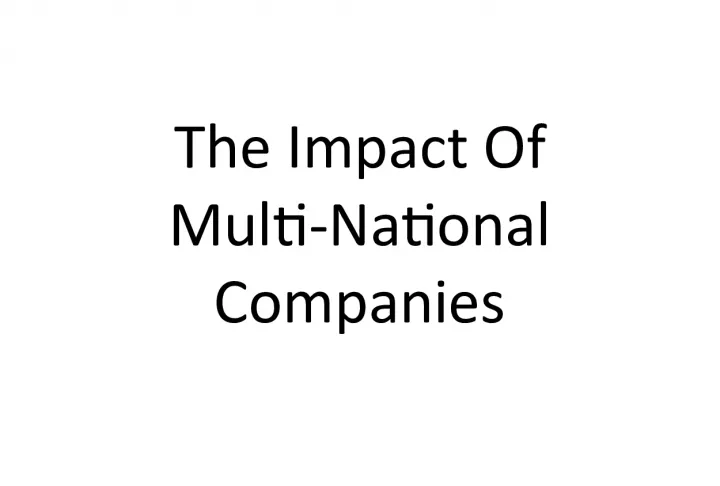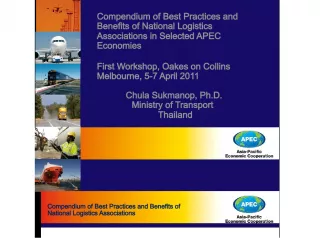The Benefits and Drawbacks of Multi-National Companies


Multi-national companies have become ubiquitous in a globalized world, leading to debates over their impact on global economics, labor markets, and social development. This article explores the pros and cons of transnational corporations, examining their role within the global community.
- Uploaded on | 1 Views
-
 briasavanna
briasavanna
About The Benefits and Drawbacks of Multi-National Companies
PowerPoint presentation about 'The Benefits and Drawbacks of Multi-National Companies'. This presentation describes the topic on Multi-national companies have become ubiquitous in a globalized world, leading to debates over their impact on global economics, labor markets, and social development. This article explores the pros and cons of transnational corporations, examining their role within the global community.. The key topics included in this slideshow are Multi-national companies, transnational corporations, globalization, labor markets, social development,. Download this presentation absolutely free.
Presentation Transcript
1. The Impact Of Multi-National Companies
2. Multinational/Transnational Multi-national or Trans-national companies are ones which locate their factories throughout the world. This gives them many benefits, such as access to the world market, cheap labour, cheaper production costs, and therefore greater profits. The headquarters of the company remains in its original country, usually one of the most developed countries in the world, such as the UK or USA. They then have factories throughout the world, which either make parts or entire finished products for the company to sell on the world market.
3. Its All About The Money Most of the largest multi-national companies are oil companies such as BP and Exxon (Esso), as well car companies (for example, Ford, Toyota, Nissan and Volkswagen). Other well-known companies such as Coca-Cola, IBM and Sony are also defined as being multi-national. Multi-national companies locate around the world for their own benefit - in other words - to make as much money as possible. They bring with them both advantages and disadvantages for the country that plays host to them.
4. How Multinationals Affect Host Countries Investment: Advantages: The companies bring much needed money into the country. Although most of their profits do return to the company's country of origin, the local economy does benefit. Disadvantages: The wages paid to local workers are often low and some companies have been accused of exploiting the local workforce rather than benefiting it. There are often tax incentives for these companies to locate in countries in the Developing World. This added to the fact that they take most of their profits out of the country, means that the actual economic benefit to the country could be minimal.
5. How Multinationals Affect Host Countries Technology: Advantages: The companies help the development of the country by bringing in technology and knowledge that the host country does not possess. Disadvantages: Unless the company actively participates in a program to educate local companies in the new technologies, the country's industry will not really benefit. Multi-national companies might be worried by sharing too much information, as they could find themselves with increased competition from local companies.
6. How Multinationals Affect Host Countries Transport: Advantages: The new companies often help to improve transport links around the area. Disadvantages: The transport links that do receive financial help from the multi-nationals often only serve the direct routes and needs of that company, not the wider area as well.
7. How Multinationals Affect Host Countries Employment: Advantages: They create jobs for the local population. Disadvantages: Often the jobs are highly skilled and so the company brings in their own people to do them. Also, the technological nature of many of these companies means that there aren't as many jobs as there might have been.
8. How Multinationals Affect Host Countries Growth poles: Advantages: The new multi-national companies act as growth poles for other similar companies. They could encourage more companies to locate in that country once they see the benefits that it brings. Disadvantages: Only a limited range of companies find that moving to a Developing World location is beneficial. They will only move there if it makes economic sense for the country. They do not consider the potential benefits to the host country.
9. How Multinationals Affect Host Countries Environment/Safety: Advantages: Companies bring with them the technology and expertise to reduce harmful pollution and create a safe working environment. Disadvantages: Many multi-national companies have very poor records on pollution and worker safety. They have been accused of trying to cut corners with both safety and pollution in order to keep costs down.
10. How Multinationals Affect Host Countries Multi-national companies in Brazil: Brazil has encouraged multi-national companies to locate in the industrial areas around the major cities of Rio de Janeiro, Belo Horizonte and Sao Paulo. Excellent transport links to most places in the world have encouraged companies to locate in the area. Companies such as Coca-Cola, Fiat and Volkswagen all have located in this area. There are plentiful natural resources, a large workforce and lots of suitable land for large-scale factories. Large industrial areas have been specifically set up outside of these great cities for the companies to locate in.























